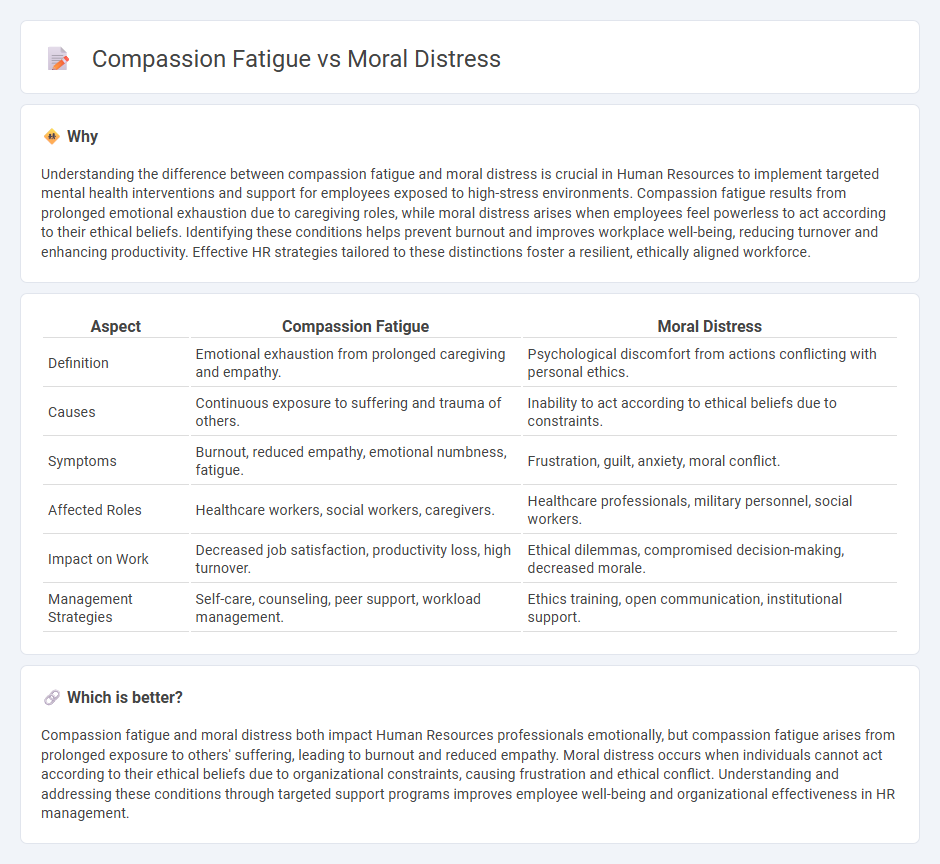
Compassion fatigue affects healthcare professionals who experience emotional exhaustion from continuous exposure to patient suffering, leading to decreased empathy and burnout. Moral distress occurs when individuals are constrained from acting according to their ethical beliefs, causing psychological discomfort and professional dissatisfaction. Explore how understanding the differences between compassion fatigue and moral distress is essential for effective human resources management in healthcare settings.
Why it is important
Understanding the difference between compassion fatigue and moral distress is crucial in Human Resources to implement targeted mental health interventions and support for employees exposed to high-stress environments. Compassion fatigue results from prolonged emotional exhaustion due to caregiving roles, while moral distress arises when employees feel powerless to act according to their ethical beliefs. Identifying these conditions helps prevent burnout and improves workplace well-being, reducing turnover and enhancing productivity. Effective HR strategies tailored to these distinctions foster a resilient, ethically aligned workforce.
Comparison Table
| Aspect | Compassion Fatigue | Moral Distress |
|---|---|---|
| Definition | Emotional exhaustion from prolonged caregiving and empathy. | Psychological discomfort from actions conflicting with personal ethics. |
| Causes | Continuous exposure to suffering and trauma of others. | Inability to act according to ethical beliefs due to constraints. |
| Symptoms | Burnout, reduced empathy, emotional numbness, fatigue. | Frustration, guilt, anxiety, moral conflict. |
| Affected Roles | Healthcare workers, social workers, caregivers. | Healthcare professionals, military personnel, social workers. |
| Impact on Work | Decreased job satisfaction, productivity loss, high turnover. | Ethical dilemmas, compromised decision-making, decreased morale. |
| Management Strategies | Self-care, counseling, peer support, workload management. | Ethics training, open communication, institutional support. |
Which is better?
Compassion fatigue and moral distress both impact Human Resources professionals emotionally, but compassion fatigue arises from prolonged exposure to others' suffering, leading to burnout and reduced empathy. Moral distress occurs when individuals cannot act according to their ethical beliefs due to organizational constraints, causing frustration and ethical conflict. Understanding and addressing these conditions through targeted support programs improves employee well-being and organizational effectiveness in HR management.
Connection
Compassion fatigue and moral distress are interconnected phenomena frequently experienced by human resources professionals managing employee well-being and organizational ethics. Compassion fatigue arises from prolonged exposure to others' suffering, leading to emotional exhaustion, while moral distress occurs when individuals recognize the ethically appropriate action but feel powerless to act due to organizational constraints. Both conditions significantly impact staff morale, productivity, and mental health, necessitating targeted HR interventions such as resilience training and ethical support systems.
Key Terms
Emotional exhaustion
Emotional exhaustion, a core component of both moral distress and compassion fatigue, manifests as overwhelming fatigue caused by prolonged emotional strain in healthcare settings. Moral distress arises when professionals feel powerless to act according to their ethical beliefs, while compassion fatigue results from empathetic overexposure to patients' suffering. Explore deeper distinctions and coping strategies to manage emotional exhaustion effectively.
Ethical conflict
Moral distress arises when healthcare professionals face ethical conflicts that prevent them from acting according to their values, causing psychological discomfort and professional dissatisfaction. Compassion fatigue, by contrast, results from the cumulative emotional burden of caring for suffering patients, leading to decreased empathy and emotional exhaustion. Explore in-depth how ethical conflicts uniquely contribute to moral distress and differentiate it from compassion fatigue to improve clinician well-being.
Burnout
Moral distress arises when healthcare professionals feel constrained from acting according to their ethical beliefs, while compassion fatigue results from prolonged exposure to patient suffering, leading to emotional exhaustion. Both contribute significantly to burnout, characterized by reduced personal accomplishment, emotional exhaustion, and depersonalization among caregivers. Explore more about distinguishing these conditions to develop targeted strategies for prevention and support.
Source and External Links
What is moral distress? - Moral distress occurs when someone feels constrained from acting on their ethical beliefs due to external pressures, often affecting healthcare professionals.
Moral Distress - Moral distress involves knowing the ethically correct action but being unable to take it, impacting healthcare teams and leading to significant negative effects.
Understanding and Addressing Moral Distress - Moral distress happens when individuals know the right thing to do but feel powerless to act, often leading to leaving jobs or the profession.
 dowidth.com
dowidth.com